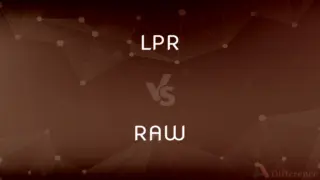Human Resource Management vs. Strategic Human Resource Management — What's the Difference?
By Tayyaba Rehman — Published on January 18, 2024
Human Resource Management (HRM) deals with the day-to-day management of personnel, while Strategic Human Resource Management (SHRM) integrates HRM with the organization’s strategic goals.

Difference Between Human Resource Management and Strategic Human Resource Management
Table of Contents
ADVERTISEMENT
Key Differences
HRM focuses on recruitment, training, performance management, and employee relations. SHRM aligns these functions with the long-term objectives of the organization.
HRM handles operational aspects such as hiring, benefits administration, and compliance with labor laws. SHRM involves planning HR policies and practices that support strategic business goals.
HRM is primarily concerned with the efficient management of human resources. In contrast, SHRM seeks to contribute to overall business performance and competitive advantage.
HRM tends to be reactive, addressing issues as they arise. SHRM is proactive, anticipating future HR needs in line with business strategy.
While HRM is essential for day-to-day employee management, SHRM plays a crucial role in aligning HR practices with the strategic direction and growth of the organization.
ADVERTISEMENT
Comparison Chart
Focus
Day-to-day management of personnel
Aligning HR with organizational goals
Primary Concerns
Recruitment, training, compliance
Long-term HR planning, strategic objectives
Role in Organization
Operational, administrative
Strategic, policy-making
Approach
Reactive to immediate HR issues
Proactive, anticipating future needs
Contribution to Business
Manages human resources efficiently
Supports overall business performance
Compare with Definitions
Human Resource Management
Manages benefits and compensation structures.
HRM reviewed the company's health insurance policy.
Strategic Human Resource Management
Contributes to overall business performance.
SHRM initiatives contributed to a significant increase in employee productivity.
Human Resource Management
Ensures adherence to labor laws and regulations.
HRM updated the company's policies in line with new labor laws.
Strategic Human Resource Management
Aligns HRM with the organization’s strategic goals.
SHRM developed a talent management strategy to support company expansion.
Human Resource Management
Addresses employee relations and compliance.
HRM handled the legal aspects of employee contracts.
Strategic Human Resource Management
Anticipates future HR needs based on business strategy.
SHRM planned workforce expansion in new markets.
Human Resource Management
Manages day-to-day personnel activities.
HRM ensured timely processing of employee payroll.
Strategic Human Resource Management
Involves long-term HR planning and policy-making.
SHRM implemented a new performance appraisal system aligned with business objectives.
Human Resource Management
Focuses on hiring, training, and performance evaluation.
HRM organized a training session for new hires.
Strategic Human Resource Management
Proactive in shaping the organization’s workforce.
SHRM introduced leadership development programs to prepare for future leadership needs.
Common Curiosities
What is the main goal of HRM?
To manage day-to-day personnel activities and administrative tasks.
What types of activities does HRM handle?
HRM handles recruitment, training, employee relations, and compliance.
Can HRM impact employee satisfaction?
Yes, through effective management of employee-related issues.
What is the focus of SHRM?
Aligning HR practices with the organization's long-term strategic goals.
How does SHRM differ from traditional HRM?
SHRM takes a strategic approach, focusing on long-term objectives.
How does HRM contribute to a company?
By ensuring efficient management of human resources.
Can SHRM influence business performance?
Yes, by strategically managing human resources to support business goals.
Do SHRM policies contribute to competitive advantage?
Yes, by developing HR practices that enhance overall performance.
What skills are important for SHRM professionals?
Strategic thinking, understanding of business objectives, and HR expertise.
What role does SHRM play in workforce planning?
SHRM anticipates future HR needs and develops strategies accordingly.
Can a small business benefit from SHRM?
Yes, SHRM can be beneficial for businesses of all sizes.
Is HRM involved in strategic planning?
HRM primarily focuses on operational aspects rather than strategic planning.
How does SHRM affect company culture?
SHRM can shape company culture to align with strategic objectives.
Is SHRM proactive or reactive?
SHRM is proactive, focusing on future HR requirements and strategies.
Should companies integrate HRM and SHRM?
Integrating both can ensure operational efficiency and strategic alignment.
Share Your Discovery

Previous Comparison
LPR vs. RAW
Next Comparison
Aikido vs. AikijutsuAuthor Spotlight
Written by
Tayyaba RehmanTayyaba Rehman is a distinguished writer, currently serving as a primary contributor to askdifference.com. As a researcher in semantics and etymology, Tayyaba's passion for the complexity of languages and their distinctions has found a perfect home on the platform. Tayyaba delves into the intricacies of language, distinguishing between commonly confused words and phrases, thereby providing clarity for readers worldwide.













































